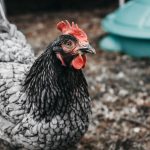Heat stress in chickens is a significant issue for poultry farmers, particularly during hot weather. Chickens are vulnerable to heat stress due to their lack of sweat glands, relying instead on panting to regulate body temperature. When temperatures exceed 85°F (29.4°C), chickens may struggle to dissipate heat effectively, potentially leading to decreased egg production, reduced feed intake, and increased mortality rates.
Recognizing the signs of heat stress in chickens is crucial for farmers. These signs include panting, wing spreading, lethargy, and reduced egg production. Early identification of these symptoms allows farmers to implement preventive measures and protect their flock’s health.
Several factors can exacerbate heat stress in chickens. High humidity levels can diminish the effectiveness of panting as a cooling mechanism. Overcrowding in coops can increase body heat and reduce air circulation, further contributing to heat stress.
Understanding these factors enables poultry farmers to take appropriate steps to mitigate heat stress and create a more comfortable environment for their chickens.
Table of Contents
- 1 Providing Adequate Shade and Ventilation
- 2 Using Water Misters and Sprinklers
- 3 Offering Cool Treats and Frozen Fruits
- 4 Adjusting Feeding and Watering Schedule
- 5 Creating Dust Baths for Natural Cooling
- 6 Monitoring the Health and Behavior of Chickens
- 7 FAQs
- 7.1 What are the best ways to keep chickens cool in Florida?
- 7.2 How can I provide shade for my chickens in Florida?
- 7.3 What are some tips for improving ventilation in a chicken coop in Florida?
- 7.4 What should I consider when providing water for my chickens in Florida?
- 7.5 Are there any specific breeds of chickens that are better suited for the Florida climate?
Key Takeaways
- Heat stress in chickens can lead to decreased egg production, poor growth, and even death
- Providing adequate shade and ventilation is crucial to help chickens cope with high temperatures
- Using water misters and sprinklers can help lower the ambient temperature and provide relief to chickens
- Offering cool treats and frozen fruits can help chickens stay hydrated and cool during hot weather
- Adjusting feeding and watering schedule to cooler times of the day can help prevent heat stress in chickens
- Creating dust baths for natural cooling can help chickens regulate their body temperature
- Monitoring the health and behavior of chickens is important to identify signs of heat stress and take necessary action
Providing Adequate Shade and Ventilation
Positioning the Coop for Optimal Shade
One of the most important steps in preventing heat stress in chickens is to provide adequate shade and ventilation in the coop and outdoor areas. This can be achieved by positioning the coop in a shaded area and ensuring that there are plenty of trees or structures that provide shade throughout the day.
Ensuring Proper Ventilation in the Coop
Additionally, it’s crucial to have proper ventilation in the coop to allow for air circulation and heat dissipation. This can be achieved by installing windows, vents, and fans to promote airflow and reduce the buildup of heat inside the coop.
Coop Design for Maximum Shade and Ventilation
Furthermore, it’s important to consider the design of the coop to maximize shade and ventilation. A well-ventilated coop with a reflective roof can help reduce the internal temperature and create a more comfortable environment for the chickens.
Reducing the Risk of Heat Stress
By providing adequate shade and ventilation, poultry farmers can significantly reduce the risk of heat stress in their flock and promote better overall health and productivity.
Using Water Misters and Sprinklers

Water misters and sprinklers are effective tools for cooling down chickens during hot weather. By installing water misters or sprinkler systems in the outdoor areas where chickens spend their time, poultry farmers can create a cooling effect that helps lower the ambient temperature. The fine mist from the water misters can help cool down the air and provide relief for the chickens, especially during the hottest parts of the day.
In addition to outdoor misters, poultry farmers can also consider installing sprinklers inside the coop to create a similar cooling effect. This can be particularly beneficial for chickens that spend a significant amount of time indoors during hot weather. By using water misters and sprinklers, farmers can help their chickens stay cool and comfortable, reducing the risk of heat stress and its associated health issues.
Offering Cool Treats and Frozen Fruits
Another effective way to help chickens beat the heat is by offering them cool treats and frozen fruits. Watermelon, cucumbers, and other fruits with high water content can provide hydration and help lower body temperature. Poultry farmers can freeze these fruits and offer them to their chickens as a refreshing snack during hot weather.
Additionally, frozen treats such as yogurt or mealworm popsicles can provide a fun and cooling treat for chickens while also helping them stay hydrated. Furthermore, providing access to cool treats and frozen fruits can also encourage chickens to eat and drink more, which is essential for maintaining their health during hot weather. By offering these treats, poultry farmers can help their flock stay cool, hydrated, and healthy, reducing the risk of heat stress and its negative effects.
Adjusting Feeding and Watering Schedule
During hot weather, it’s important for poultry farmers to adjust the feeding and watering schedule for their chickens. Feeding should be done during the cooler parts of the day, such as early morning or late evening, to reduce the metabolic heat generated by digestion. Additionally, it’s crucial to provide access to fresh, cool water at all times to ensure that chickens stay hydrated.
Furthermore, farmers should consider using shallow water containers or adding ice to the water to keep it cool throughout the day. By adjusting the feeding and watering schedule, poultry farmers can help their chickens stay comfortable and reduce the risk of heat stress during hot weather.
Creating Dust Baths for Natural Cooling

The Cooling Effect
Dust baths provide a natural way for chickens to cool down during hot weather, helping them regulate their body temperature and reduce the risk of heat stress. By creating designated dust bath areas with fine sand or diatomaceous earth, poultry farmers can encourage their chickens to engage in this behavior.
Parasite Control and Feather Health
Dust baths also offer an effective way to control parasites and keep the chickens’ feathers in good condition, promoting overall health and well-being.
Supporting Natural Behaviors
By providing opportunities for dust bathing, poultry farmers can help their flock stay cool and comfortable during hot weather while also supporting their natural behaviors. This simple yet effective practice can make a significant difference in the health and happiness of the chickens.
Monitoring the Health and Behavior of Chickens
Finally, it’s crucial for poultry farmers to closely monitor the health and behavior of their chickens during hot weather. Regularly observing the flock for signs of heat stress such as panting, wing spreading, or lethargy can help farmers identify potential issues early and take proactive measures to prevent heat stress. Additionally, monitoring egg production, feed intake, and overall behavior can provide valuable insights into the well-being of the flock during hot weather.
By staying vigilant and responsive to any signs of heat stress, poultry farmers can ensure that their chickens stay healthy and comfortable even in challenging environmental conditions. In conclusion, heat stress is a significant concern for poultry farmers during hot weather, but there are many proactive measures that can be taken to prevent its negative effects on chickens. By understanding the signs and factors that contribute to heat stress, providing adequate shade and ventilation, using water misters and sprinklers, offering cool treats and frozen fruits, adjusting feeding and watering schedules, creating dust baths for natural cooling, and monitoring the health and behavior of chickens, farmers can create a more comfortable environment for their flock and reduce the risk of heat stress-related issues.
Prioritizing the well-being of chickens during hot weather is essential for maintaining their health and productivity, ultimately benefiting both the animals and the farmers who care for them.
If you’re looking for more tips on keeping chickens cool in Florida, you might want to check out the article on “The Chicken Coop Country Diner” on PoultryWizard. This article provides valuable information on creating a comfortable and safe environment for your chickens, which is essential in the hot and humid climate of Florida. Source
FAQs
What are the best ways to keep chickens cool in Florida?
In Florida, it’s important to provide shade, proper ventilation, and access to cool water to keep chickens cool. This can be achieved through natural shade, fans, misters, and shallow pools for wading.
How can I provide shade for my chickens in Florida?
Shade can be provided through natural sources such as trees and shrubs, or by using tarps, umbrellas, or shade cloth to create shaded areas in the chicken coop or run.
What are some tips for improving ventilation in a chicken coop in Florida?
Improving ventilation in a chicken coop in Florida can be achieved by adding windows, vents, or fans to promote air circulation. This helps to reduce heat and humidity inside the coop.
What should I consider when providing water for my chickens in Florida?
In Florida’s hot climate, it’s important to provide cool, fresh water for chickens at all times. Consider using shallow water containers that can be easily refilled and adding ice to the water to keep it cool.
Are there any specific breeds of chickens that are better suited for the Florida climate?
Some chicken breeds, such as the Leghorn, Australorp, and Orpington, are known for their heat tolerance and may be better suited for the Florida climate. It’s important to research and select breeds that are well-adapted to hot and humid conditions.
Meet Walter, the feathered-friend fanatic of Florida! Nestled in the sunshine state, Walter struts through life with his feathered companions, clucking his way to happiness. With a coop that’s fancier than a five-star hotel, he’s the Don Juan of the chicken world. When he’s not teaching his hens to do the cha-cha, you’ll find him in a heated debate with his prized rooster, Sir Clucks-a-Lot. Walter’s poultry passion is no yolk; he’s the sunny-side-up guy you never knew you needed in your flock of friends!







